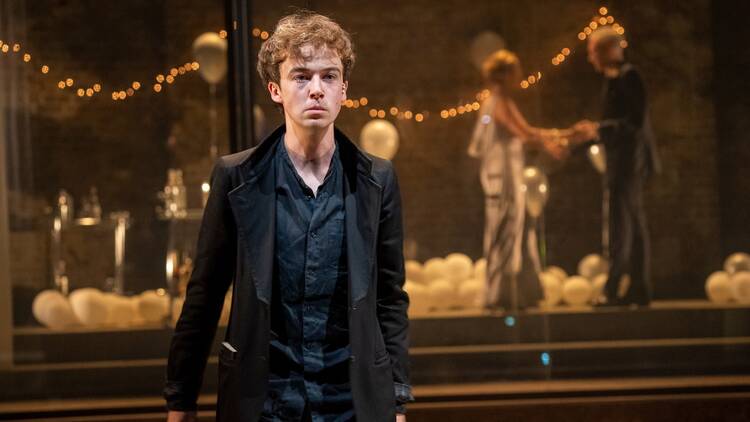Note: If you wish to receive, via e-mail, (1) my weekly newsletter or (2) daily copies of these posts, notify me at rrbates1951@gmail.com and indicate which you would like. I promise not to share your e-mail address with anyone. To unsubscribe, send me a follow-up email.
Wednesday
My faculty reading group has plunged into Hamlet, and our engagement with the work has given me insights into a disturbing story I read recently. According to Ed Kilgore of The Atlantic, Joe Biden may not have the advantage over Trump with young voters that many of us have been assuming. With the caveat that the election is still almost a year away, Kilgore fears that Trump could carry the youth vote—or if not win it outright, at least considerably shrink the margins that Hillary Clinton and Biden racked up in the past two elections.
The article put me in mind of another I read recently—I can’t find it at the moment—that believes that young people don’t have the same kind of belief in the institutions of democracy that are sacred to people like me. And because they don’t, some may be drawn to Trump’s increasingly fascistic alternative.
Now, one shouldn’t panic too early. After all, Trump and the GOP are still on the wrong side of many issues that young people care about, from abortion to student loans to LGBTQ+ rights to climate change to gun control to economic fairness. Still, we can’t foreget that Hitler managed to generate a fair degree of enthusiasm amongst disaffected young people. (Think of all you’ve heard about “Hitler youth.”) The unimaginable could happen here.
Rereading Hamlet has given me insight into our situation. The prince of Denmark returns home from college to discover that his previously stable world has been turned upside down. His revered father is dead and, instead of his mother grieving as he thinks she should, she has married his dissolute uncle. (As he puts it, “The funeral baked meats did coldly furnish forth the marriage tables.”). He’s in love with Ophelia but Polonius uses her to spy on him. She, obedient to a fault, goes along with her father, prompting Hamlet to wonder if all women are untrustworthy. (“Frailty, thy name is women,” he tells his mother at one point.) Two old friends, Rosencrantz, and Guildenstern, have also been commissioned to spy on him. There’s even a foreign threat, with Fortinbras longing to revenge Norway’s defeat at the hands of the Danes.
And to top it all off, there’s a ghost in the form of his father telling him that “murder most foul” has been committed and that he must revenge it. It’s not initially clear whether this ghost is to be believed, but Hamlet’s “mousetrap”—staging a play in which the murder is reenacted—elicits tangible truth that the ghost is telling the truth.
Still, murder is not something that one does easily, even with the facts, and young people today may be similarly confused about their options. That’s why I’m sympathetic. For the past seven years, our youth have watched Trump turn the world upside down and, with the impatience of their age, imagine that the Democrats’ measured response is a sign of weakness. After all, why is someone who tried to overthrow the government still leading the GOP. Furthermore, there are other ways that Biden (like Hamlet, Sr.) seems unable to protect them—they’ve seen the Supreme Court override him on matters of abortion and student debt. Like Hamlet, generation Z is living in a world where their elders appear helpless, hapless, and worse. Like Hamlet, they see something rotten in the state of Denmark.
In their response, we’re seeing some of the behavior we also see in Hamlet. First of all, the prince is surly with authority figures (the king and the queen). Then he feigns madness (although he may not need to do much feigning since he feels half crazed as it is). He famously contemplates suicide—or as he puts it, taking up “arms against a sea of troubles and, by opposing, end them.” He curses the fact that all the responsibility seems to be on his shoulders (“Oh cursed spite, that ever I was formed to set it right”). He lashes out against his girlfriend and his mom in some ugly ways. He also lurches from underreaction to overreaction—he comes up with a reason for not killing Claudius when he sees him praying and then impulsively puts a sword through someone behind a curtain (“I took thee for thy better,” he tells the dead Polonius). His revenge against the two hapless friends who are required to spy on him is out of proportion to their actual sins.
If our young people are acting a bit mad at times, should we be surprised? I am reminded of my own days in college (1969-73). Our generation had seen multiple assassinations, witnessed Jim Crow violence, watched riots on television, and seen the suffering caused by a war that no one could explain or justify—all the while being scolded for acting out in the various ways that we did. Hysterical Hamlet spoke for us.
Hamlet does find his bearings at the end of the play and attempts to reconcile with Laertes. He learns to see beyond his own confusion into the pain of another man. As it turns out, his efforts come too late—the wheels have already been set in motion that will end in his death—but we see that madness doesn’t get the last word.
So here’s hoping that our young and disaffected will come to see where their true interests—and where democracy’s true interests—lie. It may help that the one who sits on the throne is no Claudius but one who has come to his position legitimately. Joe Biden also genuinely cares for his Hamlets as Trump never will. That, in the end, may make a big difference.


